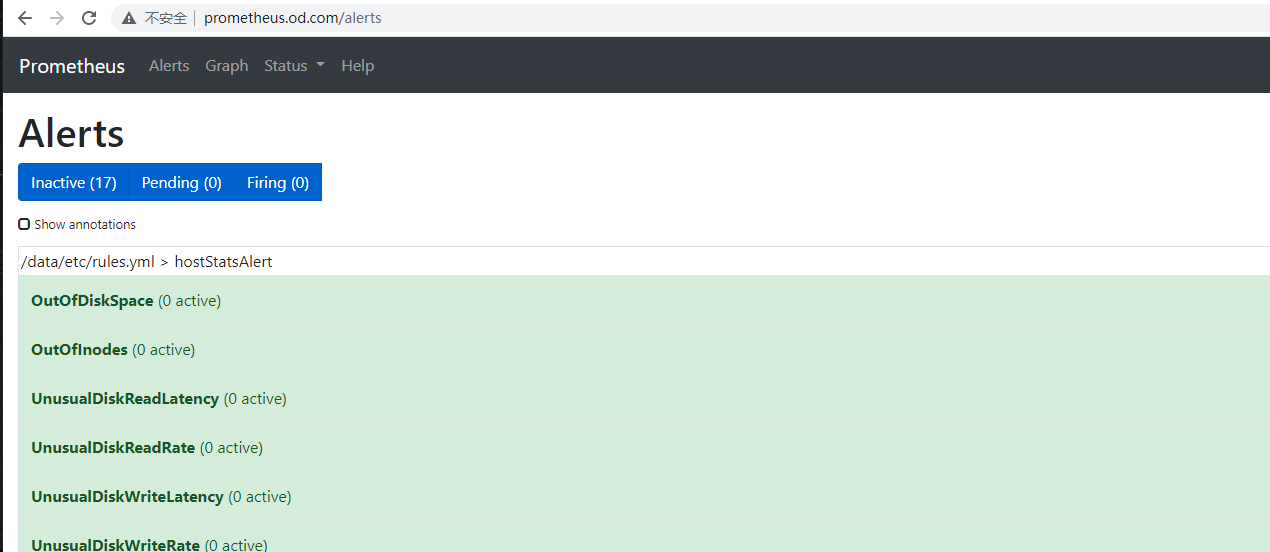Cloud native program features
The configuration of the program is passed to the inside of the container by setting the environment variable (- e parameter passes the environment variable)
The configuration of the program takes effect through the configuration of program startup parameters
The configuration of the program is managed centrally in the configuration center (configmap / integrated configuration platform apollo, etc.)
Monitor k8s required exporter plug-ins
- Kube state metrics – collect basic status information such as master & etcd
- Node exporter – collect node information
- cadvisor – collects resource information used inside the docker container
- Blackbox export – whether the collection k8sdocker container service is alive
Kube state metrics (collect Master & etcd and other basic status information)
Node 130
Download Image
[root@ceshi-132 ~]# docker pull quay.io/coreos/kube-state-metrics:v1.5.0 [root@ceshi-132 ~]# docker tag 91599517197a harbor.od.com/public/kube-state-metrics:v1.5.0 [root@ceshi-132 ~]# docker push harbor.od.com/public/kube-state-metrics:v1.5.0
Create resource configuration list
[root@ceshi-132 k8s-yaml]# mkdir kube-state-metrics
[root@ceshi-132 kube-state-metrics]# vi rbac.yaml
apiVersion: v1
kind: ServiceAccount
metadata:
labels:
addonmanager.kubernetes.io/mode: Reconcile
kubernetes.io/cluster-service: "true"
name: kube-state-metrics
namespace: kube-system
---
apiVersion: rbac.authorization.k8s.io/v1
kind: ClusterRole
metadata:
labels:
addonmanager.kubernetes.io/mode: Reconcile
kubernetes.io/cluster-service: "true"
name: kube-state-metrics
rules:
- apiGroups:
- ""
resources:
- configmaps
- secrets
- nodes
- pods
- services
- resourcequotas
- replicationcontrollers
- limitranges
- persistentvolumeclaims
- persistentvolumes
- namespaces
- endpoints
verbs:
- list
- watch
- apiGroups:
- policy
resources:
- poddisruptionbudgets
verbs:
- list
- watch
- apiGroups:
- extensions
resources:
- daemonsets
- deployments
- replicasets
verbs:
- list
- watch
- apiGroups:
- apps
resources:
- statefulsets
verbs:
- list
- watch
- apiGroups:
- batch
resources:
- cronjobs
- jobs
verbs:
- list
- watch
- apiGroups:
- autoscaling
resources:
- horizontalpodautoscalers
verbs:
- list
- watch
---
apiVersion: rbac.authorization.k8s.io/v1
kind: ClusterRoleBinding
metadata:
labels:
addonmanager.kubernetes.io/mode: Reconcile
kubernetes.io/cluster-service: "true"
name: kube-state-metrics
roleRef:
apiGroup: rbac.authorization.k8s.io
kind: ClusterRole
name: kube-state-metrics
subjects:
- kind: ServiceAccount
name: kube-state-metrics
namespace: kube-system
[root@ceshi-132 kube-state-metrics]# vi dp.yaml
apiVersion: extensions/v1beta1
kind: Deployment
metadata:
annotations:
deployment.kubernetes.io/revision: "2"
labels:
grafanak8sapp: "true"
app: kube-state-metrics
name: kube-state-metrics
namespace: kube-system
spec:
selector:
matchLabels:
grafanak8sapp: "true"
app: kube-state-metrics
strategy:
rollingUpdate:
maxSurge: 25%
maxUnavailable: 25%
type: RollingUpdate
template:
metadata:
labels:
grafanak8sapp: "true"
app: kube-state-metrics
spec:
containers:
- name: kube-state-metrics
image: harbor.od.com/public/kube-state-metrics:v1.5.0
imagePullPolicy: IfNotPresent
ports:
- containerPort: 8080
name: http-metrics
protocol: TCP
readinessProbe: #Readiness probe
failureThreshold: 3
httpGet:
path: /healthz
port: 8080
scheme: HTTP
initialDelaySeconds: 5
periodSeconds: 10
successThreshold: 1
timeoutSeconds: 5
serviceAccountName: kube-state-metrics
deliver
[root@ceshi-130 ~]# kubectl apply -f http://k8s-yaml.od.com/kube-state-metrics/rbac.yaml serviceaccount/kube-state-metrics created clusterrole.rbac.authorization.k8s.io/kube-state-metrics created clusterrolebinding.rbac.authorization.k8s.io/kube-state-metrics created [root@ceshi-130 ~]# kubectl apply -f http://k8s-yaml.od.com/kube-state-metrics/dp.yaml deployment.extensions/kube-state-metrics created
curl probe returns ok as normal
[root@ceshi-130 ~]# kubectl get pods -n kube-system -o wide NAME READY STATUS RESTARTS AGE IP NODE NOMINATED NODE READINESS GATES kube-state-metrics-8669f776c6-sv24d 1/1 Running 0 42s 172.7.21.2 ceshi-130.host.com <none> <none> [root@ceshi-130 ~]# curl 172.7.21.2:8080/healthz ok
Node exporter (collect node information)
Download Image
[root@ceshi-132 ~]# docker pull prom/node-exporter:v0.15.0 [root@ceshi-132 ~]# docker tag 12d51ffa2b22 harbor.od.com/public/node-exporter:v0.15.0 [root@ceshi-132 ~]# docker push harbor.od.com/public/node-exporter:v0.15.0 The push refers to repository [harbor.od.com/public/node-exporter]
Create resource list
[root@ceshi-132 k8s-yaml]# mkdir node-exporter [root@ceshi-132 k8s-yaml]# cd node-exporter/
Each node must have a node exporter, so the type is DaemonSet
[root@ceshi-132 node-exporter]# vi ds.yaml
kind: DaemonSet
apiVersion: extensions/v1beta1
metadata:
name: node-exporter
namespace: kube-system
labels:
daemon: "node-exporter"
grafanak8sapp: "true"
spec:
selector:
matchLabels:
daemon: "node-exporter"
grafanak8sapp: "true"
template:
metadata:
name: node-exporter
labels:
daemon: "node-exporter"
grafanak8sapp: "true"
spec:
volumes:
- name: proc
hostPath:
path: /proc
type: ""
- name: sys
hostPath:
path: /sys
type: ""
containers:
- name: node-exporter
image: harbor.od.com/public/node-exporter:v0.15.0
imagePullPolicy: IfNotPresent
args:
- --path.procfs=/host_proc
- --path.sysfs=/host_sys
ports:
- name: node-exporter
hostPort: 9100
containerPort: 9100
protocol: TCP
volumeMounts:
- name: sys
readOnly: true
mountPath: /host_sys
- name: proc
readOnly: true
mountPath: /host_proc
hostNetwork: true Host shared network
deliver
[root@ceshi-130 ~]# kubectl apply -f http://k8s-yaml.od.com/node-exporter/ds.yaml daemonset.extensions/node-exporter created
After delivery, you can see that the IP is the host, because ds is configured as hostNetwork: true to share network space with the host
[root@ceshi-130 ~]# netstat -tnlp | grep 9100 tcp 0 0 0.0.0.0:9100 0.0.0.0:* LISTEN 127117/node_exporte [root@ceshi-130 ~]# kubectl get pods -n kube-system -o wide NAME READY STATUS RESTARTS AGE IP NODE NOMINATED NODE READINESS GATES kube-state-metrics-8669f776c6-sv24d 1/1 Running 0 14m 172.7.21.2 ceshi-130.host.com <none> <none> node-exporter-22zzl 1/1 Running 0 57s 10.1.133.96 ceshi-131.host.com <none> <none> node-exporter-lbh9f 1/1 Running 0 57s 10.1.133.95 ceshi-130.host.com <none> <none>
cadvisor (collect resource information used inside the docker container)
Download Image
[root@ceshi-132 ~]# docker pull google/cadvisor:v0.28.3 [root@ceshi-132 ~]# docker tag 75f88e3ec333 harbor.od.com/public/cadvisor:v0.28.3 [root@ceshi-132 ~]# docker push harbor.od.com/public/cadvisor:v0.28.3
Create resource configuration
[root@ceshi-132 cadvisor]# vi ds.yaml
apiVersion: apps/v1
kind: DaemonSet
metadata:
name: cadvisor
namespace: kube-system
labels:
app: cadvisor
spec:
selector:
matchLabels:
name: cadvisor
template:
metadata:
labels:
name: cadvisor
spec:
hostNetwork: true Shared host cyberspace
tolerations: tolerate
- key: node-role.kubernetes.io/master If it is master node
effect: NoSchedule Impact: no scheduling
containers:
- name: cadvisor
image: harbor.od.com/public/cadvisor:v0.28.3
imagePullPolicy: IfNotPresent
volumeMounts:
- name: rootfs
mountPath: /rootfs
readOnly: true
- name: var-run
mountPath: /var/run
- name: sys
mountPath: /sys
readOnly: true
- name: docker
mountPath: /var/lib/docker
readOnly: true
ports:
- name: http
containerPort: 4194
protocol: TCP
readinessProbe:
tcpSocket:
port: 4194
initialDelaySeconds: 5
periodSeconds: 10
args:
- --housekeeping_interval=10s
- --port=4194
terminationGracePeriodSeconds: 30
volumes:
- name: rootfs
hostPath:
path: /
- name: var-run
hostPath:
path: /var/run
- name: sys
hostPath:
path: /sys
- name: docker
hostPath:
path: /data/docker
deliver
[root@ceshi-130 ~]# kubectl apply -f http://k8s-yaml.od.com/cadvisor/ds.yaml daemonset.apps/cadvisor created
===============================================================================
| Stain type | Explanation (equivalent to labeling) |
|---|---|
| kubectl taint nodes node key=value:NoSchedule | Add the effect type stain, the new pod cannot be scheduled, and the old one will not be affected |
| kubectl taint nodes node key=value:NoExecute | Add the effecf type stain, the new pod cannot be scheduled, and the old one will be removed |
| kubectl taint nodes node key=value:PreferNoSchedule | Attempts to assign the pod to this node |
Stain
[root@ceshi-130 ~]# kubectl taint nodes ceshi-130.host.com node-role.kubernetes.io/master:NoSchedule
Remove stains
[root@ceshi-130 ~]# kubectl taint nodes ceshi-130.host.com node-role.kubernetes.io/master-
yaml matching stains are shown above
tolerations: #containers peer
- key: "key1" #Tolerable stains
value: "value1" #value
effect: "NoExecute" #effect strategy, see above
There are three methods for manual K8S scheduling:
| type | explain |
|---|---|
| Stain, tolerance | (1) Stain: stain on operation node (2) tolerance: can pod tolerate stain |
| nodeName | Let the pod run on the specified node |
| nodeSelector | Through the tag selector, let the pod run on the node of a specified class |
Blackbox exporter (whether the collection k8sdocker container service is alive)
Download Image
[root@ceshi-132 ~]# docker pull prom/blackbox-exporter:v0.15.1 [root@ceshi-132 ~]# docker tag 81b70b6158be harbor.od.com/public/blackbox-exporter:v0.15.1 [root@ceshi-132 ~]# docker push harbor.od.com/public/blackbox-exporter:v0.15.1
Create resource list
[root@ceshi-132 ~]# cd /data/k8s-yaml/ [root@ceshi-132 k8s-yaml]# mkdir blackbox-exporter
[root@ceshi-132 blackbox-exporter]# cat cm.yaml
apiVersion: v1
kind: ConfigMap
metadata:
labels:
app: blackbox-exporter
name: blackbox-exporter
namespace: kube-system
data:
blackbox.yml: |-
modules:
http_2xx:
prober: http
timeout: 2s
http:
valid_http_versions: ["HTTP/1.1", "HTTP/2"]
valid_status_codes: [200,301,302]
method: GET
preferred_ip_protocol: "ip4"
tcp_connect:
prober: tcp
timeout: 2s
[root@ceshi-132 blackbox-exporter]# cat dp.yaml
kind: Deployment
apiVersion: extensions/v1beta1
metadata:
name: blackbox-exporter
namespace: kube-system
labels:
app: blackbox-exporter
annotations:
deployment.kubernetes.io/revision: 1
spec:
replicas: 1
selector:
matchLabels:
app: blackbox-exporter
template:
metadata:
labels:
app: blackbox-exporter
spec:
volumes:
- name: config
configMap:
name: blackbox-exporter
defaultMode: 420
containers:
- name: blackbox-exporter
image: harbor.od.com/public/blackbox-exporter:v0.15.1
imagePullPolicy: IfNotPresent
args:
- --config.file=/etc/blackbox_exporter/blackbox.yml
- --log.level=info
- --web.listen-address=:9115
ports:
- name: blackbox-port
containerPort: 9115
protocol: TCP
resources:
limits:
cpu: 200m
memory: 256Mi
requests:
cpu: 100m
memory: 50Mi
volumeMounts:
- name: config
mountPath: /etc/blackbox_exporter
readinessProbe:
tcpSocket:
port: 9115
initialDelaySeconds: 5
timeoutSeconds: 5
periodSeconds: 10
successThreshold: 1
failureThreshold: 3
[root@ceshi-132 blackbox-exporter]# cat svc.yaml
kind: Service
apiVersion: v1
metadata:
name: blackbox-exporter
namespace: kube-system
spec:
selector:
app: blackbox-exporter
ports:
- name: blackbox-port
protocol: TCP
port: 9115
The domain name needs to be resolved when the ingress host appears
[root@ceshi-132 blackbox-exporter]# cat ingress.yaml
apiVersion: extensions/v1beta1
kind: Ingress
metadata:
name: blackbox-exporter
namespace: kube-system
spec:
rules:
- host: blackbox.od.com
http:
paths:
- path: /
backend:
serviceName: blackbox-exporter
servicePort: blackbox-port
deliver
[root@ceshi-130 ~]# kubectl apply -f http://k8s-yaml.od.com/blackbox-exporter/cm.yaml configmap/blackbox-exporter created [root@ceshi-130 ~]# kubectl apply -f http://k8s-yaml.od.com/blackbox-exporter/dp.yaml deployment.extensions/blackbox-exporter created [root@ceshi-130 ~]# kubectl apply -f http://k8s-yaml.od.com/blackbox-exporter/svc.yaml service/blackbox-exporter created [root@ceshi-130 ~]# kubectl apply -f http://k8s-yaml.od.com/blackbox-exporter/ingress.yaml ingress.extensions/blackbox-exporter created
prometheus-server
Download Image
[root@ceshi-132 ~]# docker pull prom/prometheus:v2.14.0 [root@ceshi-132 ~]# docker tag 7317640d555e harbor.od.com/public/prometheus:v2.14.0 [root@ceshi-132 ~]# docker push harbor.od.com/public/prometheus:v2.14.0
Create resource configuration list
[root@ceshi-132 data]# cd /data/k8s-yaml/ [root@ceshi-132 k8s-yaml]# mkdir prometheus
[root@ceshi-132 prometheus]# cat rbac.yaml
apiVersion: v1
kind: ServiceAccount
metadata:
labels:
addonmanager.kubernetes.io/mode: Reconcile
kubernetes.io/cluster-service: "true"
name: prometheus
namespace: infra
---
apiVersion: rbac.authorization.k8s.io/v1
kind: ClusterRole
metadata:
labels:
addonmanager.kubernetes.io/mode: Reconcile
kubernetes.io/cluster-service: "true"
name: prometheus
rules:
- apiGroups:
- ""
resources:
- nodes
- nodes/metrics
- services
- endpoints
- pods
verbs:
- get
- list
- watch
- apiGroups:
- ""
resources:
- configmaps
verbs:
- get
- nonResourceURLs:
- /metrics
verbs:
- get
---
apiVersion: rbac.authorization.k8s.io/v1
kind: ClusterRoleBinding
metadata:
labels:
addonmanager.kubernetes.io/mode: Reconcile
kubernetes.io/cluster-service: "true"
name: prometheus
roleRef:
apiGroup: rbac.authorization.k8s.io
kind: ClusterRole
name: prometheus
subjects:
- kind: ServiceAccount
name: prometheus
namespace: infra
[root@ceshi-132 prometheus]# cat dp.yaml
apiVersion: extensions/v1beta1
kind: Deployment
metadata:
annotations:
deployment.kubernetes.io/revision: "5"
labels:
name: prometheus
name: prometheus
namespace: infra
spec:
progressDeadlineSeconds: 600
replicas: 1
revisionHistoryLimit: 7
selector:
matchLabels:
app: prometheus
strategy:
rollingUpdate:
maxSurge: 1
maxUnavailable: 1
type: RollingUpdate
template:
metadata:
labels:
app: prometheus
spec:
nodeName: ceshi-130.host.com Manual assignment pod It will be scheduled node
containers:
- name: prometheus
image: harbor.od.com/public/prometheus:v2.14.0
imagePullPolicy: IfNotPresent
command:
- /bin/prometheus
args:
- --config.file=/data/etc/prometheus.yml
- --storage.tsdb.path=/data/prom-db
- --storage.tsdb.min-block-duration=10m
- --storage.tsdb.retention=72h
- --web.enable-lifecycle
ports:
- containerPort: 9090
protocol: TCP
volumeMounts:
- mountPath: /data
name: data
resources: Restrict container resources
requests: Request on container startup
cpu: "1000m" 1c(Millicore) 1000 m=1c
memory: "1.5Gi"
limits: When the container resource usage reaches the threshold, it will be rejected kill fall
cpu: "2000m" cpu Use no more than 2 c
memory: "3Gi" Memory cannot exceed 3 G
imagePullSecrets:
- name: harbor
securityContext:
runAsUser: 0
serviceAccountName: prometheus
volumes:
- name: data
nfs:
server: 10.1.133.97
path: /data/nfsvolume/prometheus
Create mount directory
[root@ceshi-132 prometheus]# cd /data/nfsvolume/
[root@ceshi-132 nfsvolume]# mkdir prometheus/{etc,prom-db}
Copy the certificate. Because prometheus wants to automatically discover and monitor, it must interact with k8s apiserver
[root@ceshi-132 prometheus]# cd etc/ [root@ceshi-132 etc]# cp /opt/certs/ca.pem . [root@ceshi-132 etc]# cp /opt/certs/client.pem . [root@ceshi-132 etc]# cp /opt/certs/client-key.pem .
Create the Prometheus configuration file prometheus.yml
[root@ceshi-132 etc]# vi prometheus.yml
global:
scrape_interval: 15s
evaluation_interval: 15s
scrape_configs:
- job_name: 'etcd'
tls_config:
ca_file: /data/etc/ca.pem
cert_file: /data/etc/client.pem
key_file: /data/etc/client-key.pem
scheme: https
static_configs:
- targets:
- '10.1.133.93:2379'
- '10.1.133.95:2379'
- '10.1.133.96:2379'
- job_name: 'kubernetes-apiservers'
kubernetes_sd_configs:
- role: endpoints
scheme: https
tls_config:
ca_file: /var/run/secrets/kubernetes.io/serviceaccount/ca.crt
bearer_token_file: /var/run/secrets/kubernetes.io/serviceaccount/token
relabel_configs:
- source_labels: [__meta_kubernetes_namespace, __meta_kubernetes_service_name, __meta_kubernetes_endpoint_port_name]
action: keep
regex: default;kubernetes;https
- job_name: 'kubernetes-pods'
kubernetes_sd_configs:
- role: pod
relabel_configs:
- source_labels: [__meta_kubernetes_pod_annotation_prometheus_io_scrape]
action: keep
regex: true
- source_labels: [__meta_kubernetes_pod_annotation_prometheus_io_path]
action: replace
target_label: __metrics_path__
regex: (.+)
- source_labels: [__address__, __meta_kubernetes_pod_annotation_prometheus_io_port]
action: replace
regex: ([^:]+)(?::\d+)?;(\d+)
replacement: $1:$2
target_label: __address__
- action: labelmap
regex: __meta_kubernetes_pod_label_(.+)
- source_labels: [__meta_kubernetes_namespace]
action: replace
target_label: kubernetes_namespace
- source_labels: [__meta_kubernetes_pod_name]
action: replace
target_label: kubernetes_pod_name
- job_name: 'kubernetes-kubelet'
kubernetes_sd_configs:
- role: node
relabel_configs:
- action: labelmap
regex: __meta_kubernetes_node_label_(.+)
- source_labels: [__meta_kubernetes_node_name]
regex: (.+)
target_label: __address__
replacement: ${1}:10255
- job_name: 'kubernetes-cadvisor'
kubernetes_sd_configs:
- role: node
relabel_configs:
- action: labelmap
regex: __meta_kubernetes_node_label_(.+)
- source_labels: [__meta_kubernetes_node_name]
regex: (.+)
target_label: __address__
replacement: ${1}:4194
- job_name: 'kubernetes-kube-state'
kubernetes_sd_configs:
- role: pod
relabel_configs:
- action: labelmap
regex: __meta_kubernetes_pod_label_(.+)
- source_labels: [__meta_kubernetes_namespace]
action: replace
target_label: kubernetes_namespace
- source_labels: [__meta_kubernetes_pod_name]
action: replace
target_label: kubernetes_pod_name
- source_labels: [__meta_kubernetes_pod_label_grafanak8sapp]
regex: .*true.*
action: keep
- source_labels: ['__meta_kubernetes_pod_label_daemon', '__meta_kubernetes_pod_node_name']
regex: 'node-exporter;(.*)'
action: replace
target_label: nodename
- job_name: 'blackbox_http_pod_probe'
metrics_path: /probe
kubernetes_sd_configs:
- role: pod
params:
module: [http_2xx]
relabel_configs:
- source_labels: [__meta_kubernetes_pod_annotation_blackbox_scheme]
action: keep
regex: http
- source_labels: [__address__, __meta_kubernetes_pod_annotation_blackbox_port, __meta_kubernetes_pod_annotation_blackbox_path]
action: replace
regex: ([^:]+)(?::\d+)?;(\d+);(.+)
replacement: $1:$2$3
target_label: __param_target
- action: replace
target_label: __address__
replacement: blackbox-exporter.kube-system:9115
- source_labels: [__param_target]
target_label: instance
- action: labelmap
regex: __meta_kubernetes_pod_label_(.+)
- source_labels: [__meta_kubernetes_namespace]
action: replace
target_label: kubernetes_namespace
- source_labels: [__meta_kubernetes_pod_name]
action: replace
target_label: kubernetes_pod_name
- job_name: 'blackbox_tcp_pod_probe'
metrics_path: /probe
kubernetes_sd_configs:
- role: pod
params:
module: [tcp_connect]
relabel_configs:
- source_labels: [__meta_kubernetes_pod_annotation_blackbox_scheme]
action: keep
regex: tcp
- source_labels: [__address__, __meta_kubernetes_pod_annotation_blackbox_port]
action: replace
regex: ([^:]+)(?::\d+)?;(\d+)
replacement: $1:$2
target_label: __param_target
- action: replace
target_label: __address__
replacement: blackbox-exporter.kube-system:9115
- source_labels: [__param_target]
target_label: instance
- action: labelmap
regex: __meta_kubernetes_pod_label_(.+)
- source_labels: [__meta_kubernetes_namespace]
action: replace
target_label: kubernetes_namespace
- source_labels: [__meta_kubernetes_pod_name]
action: replace
target_label: kubernetes_pod_name
- job_name: 'traefik'
kubernetes_sd_configs:
- role: pod
relabel_configs:
- source_labels: [__meta_kubernetes_pod_annotation_prometheus_io_scheme]
action: keep
regex: traefik
- source_labels: [__meta_kubernetes_pod_annotation_prometheus_io_path]
action: replace
target_label: __metrics_path__
regex: (.+)
- source_labels: [__address__, __meta_kubernetes_pod_annotation_prometheus_io_port]
action: replace
regex: ([^:]+)(?::\d+)?;(\d+)
replacement: $1:$2
target_label: __address__
- action: labelmap
regex: __meta_kubernetes_pod_label_(.+)
- source_labels: [__meta_kubernetes_namespace]
action: replace
target_label: kubernetes_namespace
- source_labels: [__meta_kubernetes_pod_name]
action: replace
target_label: kubernetes_pod_name
[root@ceshi-132 prometheus]# cat svc.yaml
apiVersion: v1
kind: Service
metadata:
name: prometheus
namespace: infra
spec:
ports:
- port: 9090
protocol: TCP
targetPort: 9090
selector:
app: prometheus
[root@ceshi-132 prometheus]# cat ingress.yaml
apiVersion: extensions/v1beta1
kind: Ingress
metadata:
annotations:
kubernetes.io/ingress.class: traefik
name: prometheus
namespace: infra
spec:
rules:
- host: prometheus.od.com
http:
paths:
- path: /
backend:
serviceName: prometheus
servicePort: 9090
deliver
[root@ceshi-130 ~]# kubectl apply -f http://k8s-yaml.od.com/prometheus/rbac.yaml serviceaccount/prometheus created clusterrole.rbac.authorization.k8s.io/prometheus created clusterrolebinding.rbac.authorization.k8s.io/prometheus created [root@ceshi-130 ~]# kubectl apply -f http://k8s-yaml.od.com/prometheus/dp.yaml deployment.extensions/prometheus created [root@ceshi-130 ~]# kubectl apply -f http://k8s-yaml.od.com/prometheus/svc.yaml service/prometheus created [root@ceshi-130 ~]# kubectl apply -f http://k8s-yaml.od.com/prometheus/ingress.yaml ingress.extensions/prometheus created
Add the traifik monitoring item, add annotations at the same level of lower level labels in the template, and restart the pod
"annotations": {
"prometheus_io_scheme": "traefik",
"prometheus_io_path": "/metrics",
"prometheus_io_port": "8080"
}

blackbox detection service survivability
prometheus detects the viability of services through blackbox, not directly
TCP
"annotations": {
"blackbox_port": "80",
"blackbox_scheme": "tcp"
}
HTTP
"annotations": {
"blackbox_path": "/", (Absolute path suffix)
"blackbox_port": "8080",
"blackbox_scheme": "http"
}
JVM
"annotations": {
"prometheus.io.scrape": "true",
"prometheus.io.port": "12346",
"prometheus.io.path": "/"
}
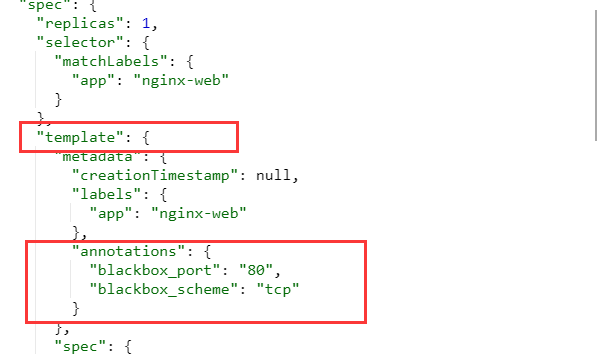
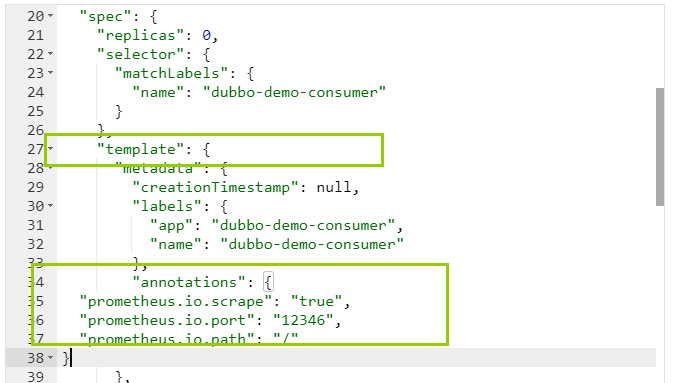
grafana
Download Image
[root@ceshi-132 ~]# docker pull grafana/grafana:5.4.2 [root@ceshi-132 ~]# docker tag 6f18ddf9e552 harbor.od.com/public/grafana:v5.4.2 [root@ceshi-132 ~]# docker push harbor.od.com/public/grafana:v5.4.2
Create resource configuration list
[root@ceshi-132 k8s-yaml]# mkdir /data/k8s-yaml/grafana/
[root@ceshi-132 grafana]# cat rbac.yaml
apiVersion: rbac.authorization.k8s.io/v1
kind: ClusterRole
metadata:
labels:
addonmanager.kubernetes.io/mode: Reconcile
kubernetes.io/cluster-service: "true"
name: grafana
rules:
- apiGroups:
- "*"
resources:
- namespaces
- deployments
- pods
verbs:
- get
- list
- watch
---
apiVersion: rbac.authorization.k8s.io/v1
kind: ClusterRoleBinding
metadata:
labels:
addonmanager.kubernetes.io/mode: Reconcile
kubernetes.io/cluster-service: "true"
name: grafana
roleRef:
apiGroup: rbac.authorization.k8s.io
kind: ClusterRole
name: grafana
subjects:
- kind: User
name: k8s-node
[root@ceshi-132 grafana]# cat dp.yaml
apiVersion: extensions/v1beta1
kind: Deployment
metadata:
labels:
app: grafana
name: grafana
name: grafana
namespace: infra
spec:
progressDeadlineSeconds: 600
replicas: 1
revisionHistoryLimit: 7
selector:
matchLabels:
name: grafana
strategy:
rollingUpdate:
maxSurge: 1
maxUnavailable: 1
type: RollingUpdate
template:
metadata:
labels:
app: grafana
name: grafana
spec:
containers:
- name: grafana
image: harbor.od.com/public/grafana:v5.4.2
imagePullPolicy: IfNotPresent
ports:
- containerPort: 3000
protocol: TCP
volumeMounts:
- mountPath: /var/lib/grafana
name: data
imagePullSecrets:
- name: harbor
securityContext:
runAsUser: 0
volumes:
- nfs:
server: 10.1.133.97
path: /data/nfsvolume/grafana
name: data
Create mount directory
[root@ceshi-132 grafana]# mkdir /data/nfsvolume/grafana
[root@ceshi-132 grafana]# cat svc.yaml
apiVersion: v1
kind: Service
metadata:
name: grafana
namespace: infra
spec:
ports:
- port: 3000
protocol: TCP
targetPort: 3000
selector:
app: grafana
[root@ceshi-132 grafana]# cat ingress.yaml
apiVersion: extensions/v1beta1
kind: Ingress
metadata:
name: grafana
namespace: infra
spec:
rules:
- host: grafana.od.com Resolve domain name
http:
paths:
- path: /
backend:
serviceName: grafana
servicePort: 3000
deliver
[root@ceshi-130 ~]# kubectl apply -f http://k8s-yaml.od.com/grafana/rbac.yaml clusterrole.rbac.authorization.k8s.io/grafana created clusterrolebinding.rbac.authorization.k8s.io/grafana created [root@ceshi-130 ~]# kubectl apply -f http://k8s-yaml.od.com/grafana/dp.yaml deployment.extensions/grafana created [root@ceshi-130 ~]# kubectl apply -f http://k8s-yaml.od.com/grafana/svc.yaml service/grafana created [root@ceshi-130 ~]# kubectl apply -f http://k8s-yaml.od.com/grafana/ingress.yaml ingress.extensions/grafana created
After delivery, the user password defaults to admin/admin
Installing the grafana plug-in
[root@ceshi-130 ~]# kubectl exec -it grafana-5c6f59bcb7-9bc44 -n infra bash root@grafana-5c6f59bcb7-9bc44:/usr/share/grafana# grafana-cli plugins install grafana-kubernetes-app root@grafana-5c6f59bcb7-9bc44:/usr/share/grafana# grafana-cli plugins install grafana-clock-panel root@grafana-5c6f59bcb7-9bc44:/usr/share/grafana# grafana-cli plugins install grafana-piechart-panel root@grafana-5c6f59bcb7-9bc44:/usr/share/grafana# grafana-cli plugins install briangann-gauge-panel root@grafana-5c6f59bcb7-9bc44:/usr/share/grafana# grafana-cli plugins install natel-discrete-panel
Restart pod
[root@ceshi-131 ~]# kubectl delete pod grafana-5c6f59bcb7-9bc44 -n infra pod "grafana-5c6f59bcb7-9bc44" deleted
add data source --> Prometheus
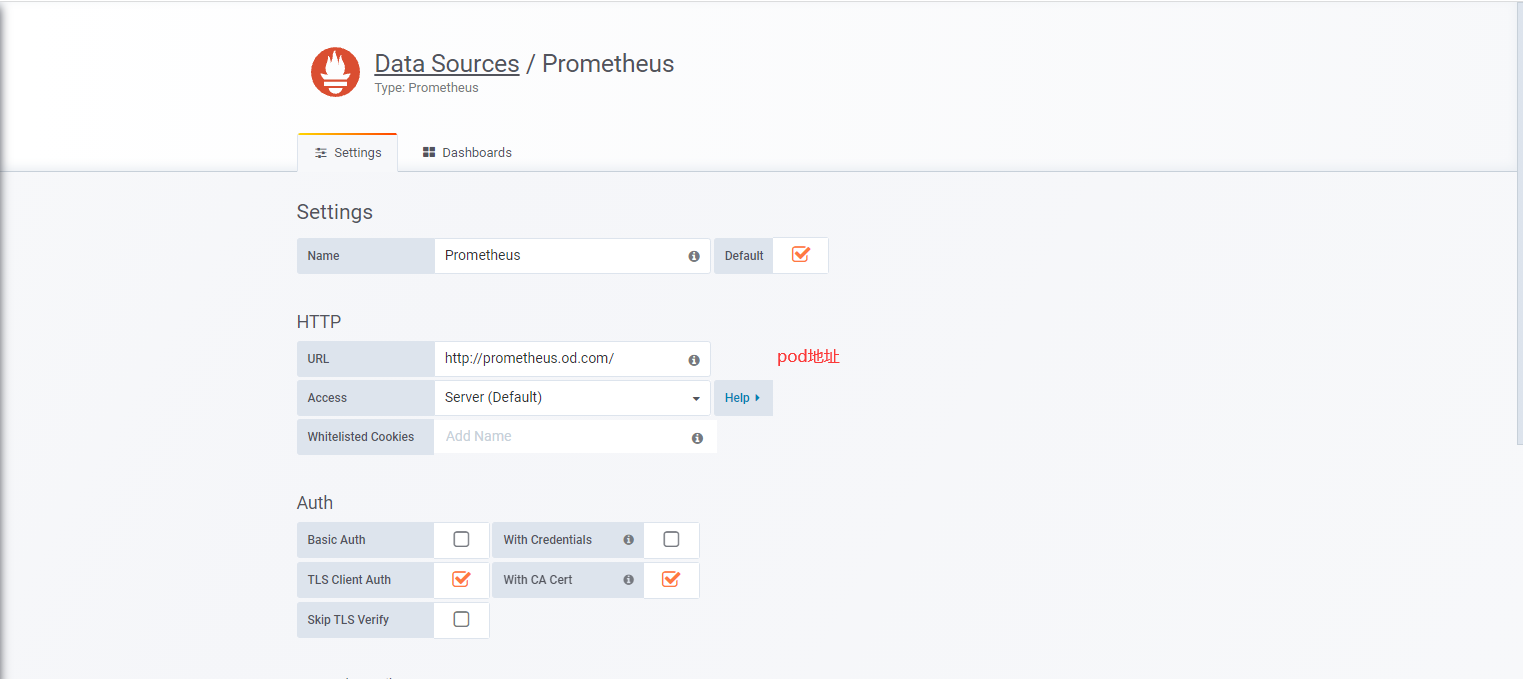
Start the K8S plug-in and add a cluster
plugins --> kubernetes --> enable --> new cluster
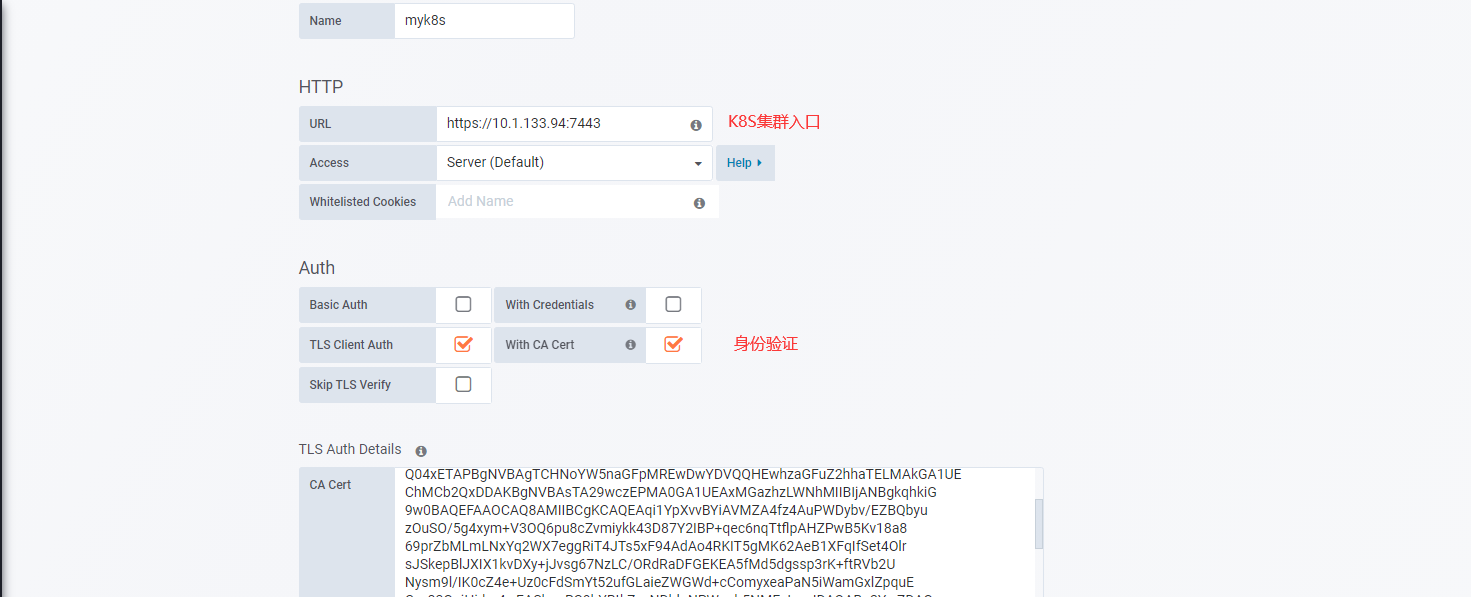
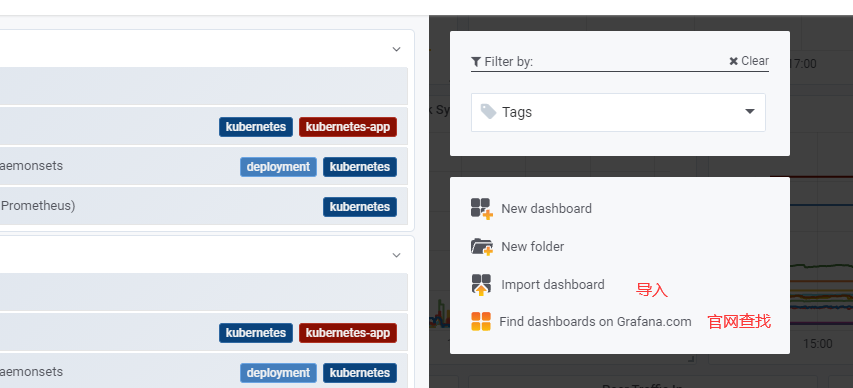
alertmanager alarm plug-in
Download Image
[root@ceshi-132 ~]# docker pull docker.io/prom/alertmanager:v0.14.0 [root@ceshi-132 ~]# docker tag 30594e96cbe8 harbor.od.com/public/alertmanager:v0.14.0 [root@ceshi-132 ~]# docker push harbor.od.com/public/alertmanager:v0.14.0
Create resource configuration list
[root@ceshi-132 alertmanager]# cat cm.yaml
apiVersion: v1
kind: ConfigMap
metadata:
name: alertmanager-config
namespace: infra
data:
config.yml: |-
global:
# Time declared resolved without alarm
resolve_timeout: 5m
# Configure mail sending information
smtp_smarthost: 'smtp.163.com:25'
smtp_from: 'xxx@163.com'
smtp_auth_username: 'xxxx@163.com'
smtp_auth_password: 'xxxx'
smtp_require_tls: false
# The root route after all alarm information enters, which is used to set the alarm distribution policy
route:
# The tag list here is the regrouping tag after receiving the alarm information. For example, many alarm information with tags such as cluster=A and alertname=LatncyHigh in the received alarm information will be aggregated into one packet in batch
group_by: ['alertname', 'cluster']
# When a new alarm group is created, it needs to wait for at least one group_wait time to initialize the notification, which ensures that you have enough time to get multiple alarms for the same group, and then trigger the alarm information together.
group_wait: 30s
# Wait for 'Group' after the first alarm is sent_ Interval 'time to send a new set of alarm information.
group_interval: 5m
# If an alarm message has been sent successfully, wait for 'repeat'_ Interval 'time to resend them
repeat_interval: 5m
# Default receiver: if an alarm is not matched by a route, it will be sent to the default receiver
receiver: default
receivers:
- name: 'default'
email_configs:
- to: 'xxx.com'
send_resolved: true
[root@ceshi-132 alertmanager]# cat dp.yaml
apiVersion: extensions/v1beta1
kind: Deployment
metadata:
name: alertmanager
namespace: infra
spec:
replicas: 1
selector:
matchLabels:
app: alertmanager
template:
metadata:
labels:
app: alertmanager
spec:
containers:
- name: alertmanager
image: harbor.od.com/public/alertmanager:v0.14.0
args:
- "--config.file=/etc/alertmanager/config.yml"
- "--storage.path=/alertmanager"
ports:
- name: alertmanager
containerPort: 9093
volumeMounts:
- name: alertmanager-cm
mountPath: /etc/alertmanager
volumes:
- name: alertmanager-cm
configMap:
name: alertmanager-config
imagePullSecrets:
- name: harbor
[root@ceshi-132 alertmanager]# cat svc.yaml
apiVersion: v1
kind: Service
metadata:
name: alertmanager
namespace: infra
spec:
selector:
app: alertmanager
ports:
- port: 80
targetPort: 9093
deliver
[root@ceshi-130 ~]# kubectl apply -f http://k8s-yaml.od.com/dubbo-demo-service/dp.yaml deployment.extensions/dubbo-demo-service created [root@ceshi-130 ~]# kubectl apply -f http://k8s-yaml.od.com/alertmanager/cm.yaml configmap/alertmanager-config created [root@ceshi-130 ~]# kubectl apply -f http://k8s-yaml.od.com/alertmanager/dp.yaml deployment.extensions/alertmanager created [root@ceshi-130 ~]# kubectl apply -f http://k8s-yaml.od.com/alertmanager/svc.yaml service/alertmanager created
Alarm rules
[root@ceshi-132 etc]# vi /data/nfsvolume/prometheus/etc/rules.yml
groups:
- name: hostStatsAlert
rules:
- alert: hostCpuUsageAlert
expr: sum(avg without (cpu)(irate(node_cpu{mode!='idle'}[5m]))) by (instance) > 0.85
for: 5m
labels:
severity: warning
annotations:
summary: "{{ $labels.instance }} CPU usage above 85% (current value: {{ $value }}%)"
- alert: hostMemUsageAlert
expr: (node_memory_MemTotal - node_memory_MemAvailable)/node_memory_MemTotal > 0.85
for: 5m
labels:
severity: warning
annotations:
summary: "{{ $labels.instance }} MEM usage above 85% (current value: {{ $value }}%)"
- alert: OutOfInodes
expr: node_filesystem_free{fstype="overlay",mountpoint ="/"} / node_filesystem_size{fstype="overlay",mountpoint ="/"} * 100 < 10
for: 5m
labels:
severity: warning
annotations:
summary: "Out of inodes (instance {{ $labels.instance }})"
description: "Disk is almost running out of available inodes (< 10% left) (current value: {{ $value }})"
- alert: OutOfDiskSpace
expr: node_filesystem_free{fstype="overlay",mountpoint ="/rootfs"} / node_filesystem_size{fstype="overlay",mountpoint ="/rootfs"} * 100 < 10
for: 5m
labels:
severity: warning
annotations:
summary: "Out of disk space (instance {{ $labels.instance }})"
description: "Disk is almost full (< 10% left) (current value: {{ $value }})"
- alert: UnusualNetworkThroughputIn
expr: sum by (instance) (irate(node_network_receive_bytes[2m])) / 1024 / 1024 > 100
for: 5m
labels:
severity: warning
annotations:
summary: "Unusual network throughput in (instance {{ $labels.instance }})"
description: "Host network interfaces are probably receiving too much data (> 100 MB/s) (current value: {{ $value }})"
- alert: UnusualNetworkThroughputOut
expr: sum by (instance) (irate(node_network_transmit_bytes[2m])) / 1024 / 1024 > 100
for: 5m
labels:
severity: warning
annotations:
summary: "Unusual network throughput out (instance {{ $labels.instance }})"
description: "Host network interfaces are probably sending too much data (> 100 MB/s) (current value: {{ $value }})"
- alert: UnusualDiskReadRate
expr: sum by (instance) (irate(node_disk_bytes_read[2m])) / 1024 / 1024 > 50
for: 5m
labels:
severity: warning
annotations:
summary: "Unusual disk read rate (instance {{ $labels.instance }})"
description: "Disk is probably reading too much data (> 50 MB/s) (current value: {{ $value }})"
- alert: UnusualDiskWriteRate
expr: sum by (instance) (irate(node_disk_bytes_written[2m])) / 1024 / 1024 > 50
for: 5m
labels:
severity: warning
annotations:
summary: "Unusual disk write rate (instance {{ $labels.instance }})"
description: "Disk is probably writing too much data (> 50 MB/s) (current value: {{ $value }})"
- alert: UnusualDiskReadLatency
expr: rate(node_disk_read_time_ms[1m]) / rate(node_disk_reads_completed[1m]) > 100
for: 5m
labels:
severity: warning
annotations:
summary: "Unusual disk read latency (instance {{ $labels.instance }})"
description: "Disk latency is growing (read operations > 100ms) (current value: {{ $value }})"
- alert: UnusualDiskWriteLatency
expr: rate(node_disk_write_time_ms[1m]) / rate(node_disk_writes_completedl[1m]) > 100
for: 5m
labels:
severity: warning
annotations:
summary: "Unusual disk write latency (instance {{ $labels.instance }})"
description: "Disk latency is growing (write operations > 100ms) (current value: {{ $value }})"
- name: http_status
rules:
- alert: ProbeFailed
expr: probe_success == 0
for: 1m
labels:
severity: error
annotations:
summary: "Probe failed (instance {{ $labels.instance }})"
description: "Probe failed (current value: {{ $value }})"
- alert: StatusCode
expr: probe_http_status_code <= 199 OR probe_http_status_code >= 400
for: 1m
labels:
severity: error
annotations:
summary: "Status Code (instance {{ $labels.instance }})"
description: "HTTP status code is not 200-399 (current value: {{ $value }})"
- alert: SslCertificateWillExpireSoon
expr: probe_ssl_earliest_cert_expiry - time() < 86400 * 30
for: 5m
labels:
severity: warning
annotations:
summary: "SSL certificate will expire soon (instance {{ $labels.instance }})"
description: "SSL certificate expires in 30 days (current value: {{ $value }})"
- alert: SslCertificateHasExpired
expr: probe_ssl_earliest_cert_expiry - time() <= 0
for: 5m
labels:
severity: error
annotations:
summary: "SSL certificate has expired (instance {{ $labels.instance }})"
description: "SSL certificate has expired already (current value: {{ $value }})"
- alert: BlackboxSlowPing
expr: probe_icmp_duration_seconds > 2
for: 5m
labels:
severity: warning
annotations:
summary: "Blackbox slow ping (instance {{ $labels.instance }})"
description: "Blackbox ping took more than 2s (current value: {{ $value }})"
- alert: BlackboxSlowRequests
expr: probe_http_duration_seconds > 2
for: 5m
labels:
severity: warning
annotations:
summary: "Blackbox slow requests (instance {{ $labels.instance }})"
description: "Blackbox request took more than 2s (current value: {{ $value }})"
- alert: PodCpuUsagePercent
expr: sum(sum(label_replace(irate(container_cpu_usage_seconds_total[1m]),"pod","$1","container_label_io_kubernetes_pod_name", "(.*)"))by(pod) / on(pod) group_right kube_pod_container_resource_limits_cpu_cores *100 )by(container,namespace,node,pod,severity) > 80
for: 5m
labels:
severity: warning
annotations:
summary: "Pod cpu usage percent has exceeded 80% (current value: {{ $value }}%)"
Configure the prometheus file and restart
[root@ceshi-132 etc]# vi /data/nfsvolume/prometheus/etc/prometheus.yml
alerting:
alertmanagers:
- static_configs:
- targets: ["alertmanager"]
rule_files:
- "/data/etc/rules.yml"
The configuration is reloaded smoothly. Because some services are too large, stopping and restarting is easy to bring down the whole cluster
[root@ceshi-130 ~]# kill -SIGHUP 113990
